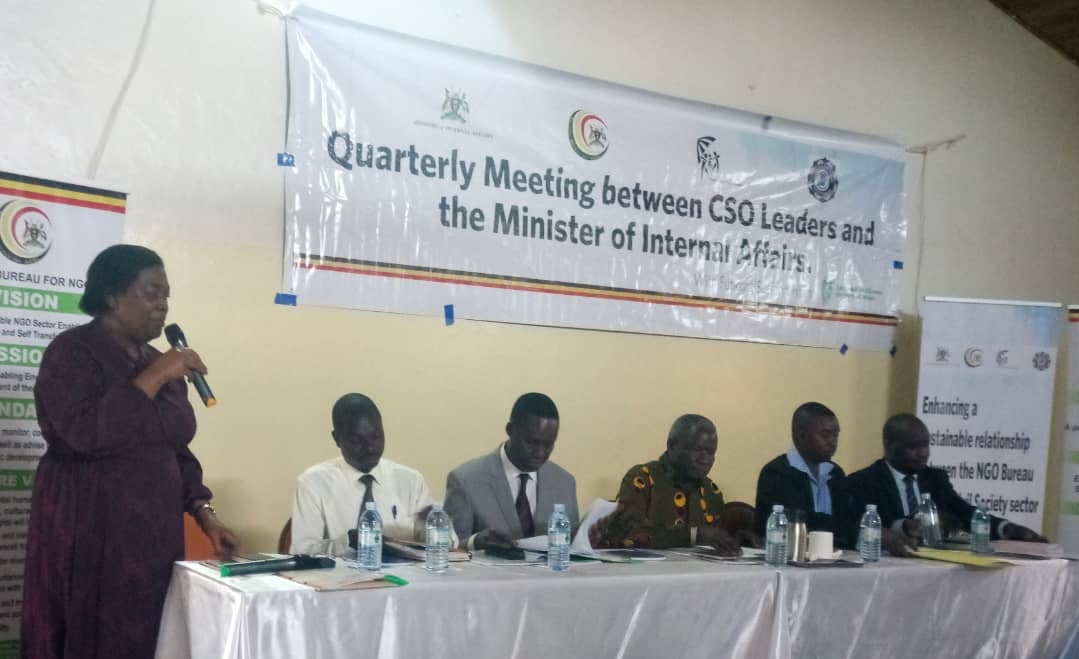CSOs-Government meeting
Introduction
Over the last two years or so, it has become common practice for CSO leaders in Uganda to interact with the Minister of Internal Affairs, who heads the ministry that provides oversight for NGO registration in the country. These dialogues were started as a way of addressing pertinent issues that affect the CSOs operating environment in the country.
The most recent dialogue took place in Arua and was attended by CSO leaders representing about 105 organizations from across the country; key government officials including the minister of Internal Affairs. This note provides a summary of the key issues discussed at the meeting.
Key Issues raised at this meeting
The key issues discussed at the meeting are grouped into 5 major themes as below:
1. Implementation of the NGO Act and regulations
While the NGO Bureau has been working closely with NGOs including Chapter Four, NGO Forum, and the Human Rights Centre to create awareness about the new legal regime for NGOs, it was noted that several stakeholders are still implementing the old legal framework. It was also noted that several districts were collecting un-receipted and thus unaccounted for dues from NGOs, and that there was weak monitoring of NGOs on the ground owing to the lack of funding for the District NGO Monitoring Committees, and the misinterpretation of the provision for the MOU between NGOs and the District. These and other challenges clearly call for a more standardized and focused approaches towards sensitization of stakeholders.
2. CSO Operating Space Issues
NGOs leaders raised several concerns over their operating space. It was noted that on the whole, there seems to be a systematic attack on NGOs by the government. For example, the raids by government on NGOs such as GLISS, UHURU Institute, Solidarity Uganda and Public Affairs Centre without any report a year on; the allegations by several government officials including the President that NGOs are supporting subversion and thus the threat to “deal” with them, and the increasing NGO break ins where up to 40 NGOs have had their office broken into since 2014, without any official police report.
It was thus agreed that there was need for a formal engagement with respective entities such as the Police to ensure that these concerns are settled. At a higher level, the Minister requested that such operating space concerns are regularly shared with him through the NGO Bureau for a possibility of discussing them at cabinet.
3. Key Government concerns about the sector
On its part, government was concerned with what it termed, “the partiality of the sector”, specifically referring to the alleged bias by CSOs towards the State in the events that followed the Arua by-election of Hon. Kassiano Wadri. Specifically, that CSOs condemned the torture of Hon. Robert Kyagulanyi, and 34 others, without blaming them for blocking the President’s convoy and stoning one of the presidential convey vehicles tantamount to bias by the sector. This was raised by the RDC and reechoed by the Minister. It was agreed that while NGOs needed to retain their neutrality, no excuse can be given for torture by the State, and should be strongly condemned.
4. The Accountability Question
Issues of accountability were raised by both sides. The Minister was concerned about how NGOs fundraise, and instructed the Bureau to ensure that all NGO monies go through Bank of Uganda for close monitoring, and ensure that it is used to implement lawful activities. CSO leaders on the other hand raised concern on how government uses the information that it collects from NGOs such as annual returns, special filing requests, among others. They were also concerned that tax exemption for not-for-profit entities was not clear. It was thus proposed that the NGO Bureau conducts an analysis of all annual returns of NGOs to ascertain the value and contribution of NGOs to GDP. The Executive Director of the Bureau advised NGOs to acquaint themselves with the relevant tax laws to ensure compliance.
5. The refugee influx
That Arua district being one of the biggest refugee host districts in the country did not only raise security concerns but also socioeconomic challenges. It was also noted that sometimes NGOs don’t respond to crises in a timely manner when required especially owing to their internal and donor related challenges. Of concern too was the finding that some donors implement projects directly, by hiring expensive and unskilled consultants, denying the more experienced NGOs on the ground requisite resources. It was thus agreed that both government and NGOs push donors to allow for more flexibility to cover times of crisis, and also stop direct implementation.
Way Forward
A standard M&E framework and tools be developed jointly by NGOs and the Bureau to facilitate the work of the District NGO Monitoring Committees
Dissemination of guidelines from the sub-county through to the District and National levels to ensure compliance by all stakeholders.
The need to expedite the process of setting up NGO Bureau branch offices, as well as the electronic system for the Bureau to expedite effective support services to the sector.
Simplification of the NGO Act, policy and regulations to resolve interpretation challenges
The need for NGOs to make use of the appellant provision in the NGO Act, in case of any perceived unfair treatment by the Bureau
That the next meeting be held in a more centralized location like Kampala to enable more NGO leaders from across the country to participate. The Minister committed to request the President to address this meeting. This would help CSOs to understand better his concerns with the sector, but also for him to appreciate the contribution of NGOs to development.

